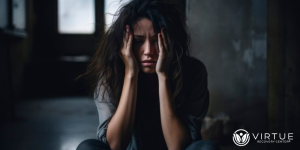Key Takeaways
- Dual diagnosis works on both mental health and substance use disorders at the same time to help people stay sober.
- Bipolar disorder and addiction typically go hand in hand since they share neurochemical pathways, and people with bipolar disorder often self-medicate.
- Specialized rehab programs can help with both disorders by providing psychological support, managing medications, and combining therapy.
- You can get personalized dual diagnosis therapy at a residential treatment program.
- Screening methods based on evidence, like AUDIT, and trauma-focused therapies help with accurate diagnosis and long-term healing.
Introduction
It’s hard enough to deal with addiction, but when you add a mental health problem like bipolar illness to the mix, things get even more difficult. People who have both issues are often misdiagnosed or not treated enough, which causes them to go through cycles of relapse, hospitalization, or severe symptoms. This is where dual diagnosis treatment comes in.
A dual diagnosis approach understands that addiction and mental illness are not separate issues. Patients can take charge of their feelings and decisions by receiving medication, treatment, and structured support simultaneously. Dual diagnosis care is a kind and clinically sound way to get back on track and stay sober, whether you go to a recovery center in person or online.
Why Do People with Bipolar Disorder and Addiction Often Have Both?
People with bipolar disorder have huge mood swings, going from very low to very high. For some people, drugs like alcohol, painkillers, or stimulants become ways to either stop or make these episodes last longer. What starts as self-medication can turn into physical dependence and emotional instability over time.
A lot of people don’t know that mental disorders and addiction often go hand in hand. The National Institute on Drug Abuse says that people with mood disorders are about twice as likely to have substance use problems as people in general (NIDA, 2018).
These diseases make each other worse: addiction makes mood swings worse, and untreated bipolar symptoms make cravings or impulsive usage worse. That’s why professional dual diagnosis rehab treatment is so necessary: it addresses both the underlying issues and the readily apparent symptoms.
What Is the Process of Dual Diagnosis Treatment?
A complete clinical assessment is the first step in dual diagnosis programs. This could include a psychiatric evaluation, a history of addiction, and the use of standardized tests like the Alcohol Use Disorders Identification Test (AUDIT) to look for problems with alcohol (WHO).
Once both illnesses have been established, therapy is planned using an integrated care strategy that includes:
- Managing medications: For bipolar disorder, mood stabilizers, antidepressants, or antipsychotics, as well as drugs to help with withdrawal or cravings.
- Cognitive Behavioral Therapy (CBT): Helps you change the way you think about things that aren’t right and learn how to deal with them.
- Dialectical Behavior Therapy (DBT): Beneficial for handling powerful emotions.
- Group Therapy: Builds community and makes people feel less alone.
- Trauma-informed Care is essential for people with PTSD or emotional trauma, which can lead to drug abuse.
This structured, interdisciplinary approach maintains mental health and addiction services tightly linked, which is better for patients than typical programs that treat them independently.
What Part Does Residential Treatment Play in Recovery from Dual Diagnosis?
Individuals who require stabilization and extensive support often receive the best care in residential programs. Clients live on the property and get medical treatment, therapy, mental care, and support from other clients around the clock. This framework can save the lives of people who have bipolar disease and are addicted.
The safety and predictability of residential treatment help individuals in early recovery establish routines, avoid triggers, and build their strength. Inpatient treatment is also excellent for people who are going through detox, having suicidal thoughts, or making changes to their medications.
An integrated drug detox program in a residential facility makes sure that clients can safely stop using drugs while still getting psychological assistance, which is essential for keeping their moods stable.
How Does Treatment for PTSD Fit into Care for People with Dual Diagnoses?

A lot of people who have both a mental illness and a physical illness also have PTSD. If not treated, trauma can make bipolar symptoms worse and lead to addiction. Somatic therapies, or trauma-focused CBT, are all examples of PTSD treatments that should be part of effective multiple diagnosis treatment.
SAMHSA says that integrated trauma therapy is an essential aspect of complete dual diagnosis programs because it assists in stabilizing mood and lowers the risk of addiction triggers (SAMHSA, 2014).
Treating trauma, addiction, and bipolar disease all at once, instead of one at a time, makes sure that the healing process is complete.
Why Is It Important to Screen Early for Long-Term Recovery?
If you have undiagnosed bipolar disorder, it can make it harder to recover from addiction. Someone may seem to be relapsing over and over again when they are going through untreated manic or depressed episodes. This shows how important it is to get help early and have professionals examine people using instruments like the Alcohol Use Disorders Identification Test ( AUDIT) or the Mood Disorder Questionnaire (MDQ).
Dual diagnosis programs identify these problems early and treat them promptly, which saves lives and prevents people from suffering for an extended period. If you’ve tried treatment before and it didn’t work, you might want to think about whether you have a mood illness that hasn’t been diagnosed yet.
Conclusion
Bipolar disorder and addiction are both quite strong on their own, but when they come together, they need a particular, caring, and clinically sound approach. Dual diagnosis treatment does just that: it combines psychiatric care with addiction therapies that have been shown to work to help both the mind and the body.
When these services are offered as part of holistic substance abuse treatment, individuals receive care that supports the whole person—mind, body, and spirit. This leads to more profound healing, better coping strategies, and a stronger foundation for recovery.
Don’t settle for a one-size-fits-all strategy if you or someone you care about is dealing with both substance abuse and mental health difficulties. To speak with our caring staff, please call Virtue Recovery Center in Killeen at 866-843-0545. We can help you or someone you care about find hope, healing, and a life free of addiction.
Frequently Asked Questions
1. What is the treatment for dual diagnosis?
Dual diagnosis treatment is a comprehensive program that treats both substance use disorders and mental health problems that happen at the same time, such as bipolar illness or PTSD.
2. Can being bipolar make you a person with an addiction?
Bipolar disease doesn’t directly cause addiction, but the extreme mood swings might make people use drugs to control themselves, which can lead to addiction.
3. What drugs are used to treat people with dual diagnosis?
Mood stabilizers, antidepressants, antipsychotics, and drugs like buprenorphine or naltrexone that help with addiction are all common prescriptions.
4. Is it required to live in a treatment center for dual diagnosis?
Yes, in many circumstances. Residential care provides the structure and intensity necessary to safely treat both illnesses simultaneously.
5. Is it possible to obtain help with dual diagnosis online?
Yes. Virtual rehabilitation centers offer treatment, psychiatry, and support groups online, but they might not be the best choice for severe detox or crises.
Resource Links:
- National Institute on Drug Abuse. Principles of Drug Addiction Treatment: A Research-Based Guide (Third Edition). National Institutes of Health, 2018. https://nida.nih.gov/publications/principles-drug-addiction-treatment-research-based-guide-third-edition
- Substance Abuse and Mental Health Services Administration. TIP 57: Trauma-Informed Care in Behavioral Health Services. U.S. Department of Health and Human Services, 2014. https://store.samhsa.gov/product/TIP-57-Trauma-Informed-Care-in-Behavioral-Health-Services/SMA14-4816
- World Health Organization. AUDIT: The Alcohol Use Disorders Identification Test—Guidelines for Use in Primary Care, 2001. https://www.who.int/publications/i/item/audit-the-alcohol-use-disorders-identification-test-guidelines-for-use-in-primary-health-care
- National Institute of Mental Health. Bipolar Disorder. U.S. Department of Health and Human Services, 2022. https://www.nimh.nih.gov/health/topics/bipolar-disorder
- About the Author
- Latest Posts
Gigi Price holds licenses as a Master Social Worker and Clinical Drug Counselor. She completed her master’s degree in Social Work at Texas State University. Over the last decade, Gigi has been dedicated to utilizing evidence-based practices to enhance patient care and treatment planning, resulting in positive, long-term outcomes for patients and their families. Her passion lies in creating a treatment environment where professionals collaborate to bring about positive change and provide a safe, trustworthy therapeutic experience. Patients can be confident in receiving top-quality care under her leadership.
In her role as the Clinical Director of Virtue Recovery Houston, Gigi conducted research to identify the most effective approaches for treating patients with acute mental health diagnoses, PTSD, and Substance Use Disorder. She then assembled a team of skilled clinicians who could offer various therapeutic modalities, such as Cognitive Behavioral Therapy (CBT), Dialectical Behavioral Therapy
(DBT), Acceptance and Commitment Therapy (ACT), Somatic Exposure, Eye Movement Desensitization and Reprocessing (EMDR), and Cognitive Processing Therapy (CPT). Gigi takes pride in overseeing the development and implementation of Virtue Houston’s Treatment Program, which includes two specialized therapeutic curricula tailored to the unique needs of individuals struggling with mental health issues, addiction, and PTSD.












